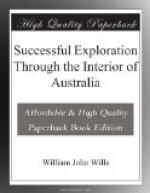. . .
After general instructions, Mr. McKinlay’s duties were more specifically defined:—
You will in all matters keep the following objects in full view:—
Firstly. The relief of the expedition under the command of Mr. Burke, or the acquiring a knowledge of its fate. This is the great object of the expedition under your command.
When you may have accomplished the foregoing, or may have deemed it necessary to abandon the search for Mr. Burke, then,
Secondly. The acquiring a knowledge of the country between Eyre’s Creek and Central Mount Stuart.
Thirdly. The acquiring a knowledge of the western shores of Lake Eyre. A separate letter of instructions is given to you and the particular matters to which you will direct your attention in this locality.
. . .
I had been in Adelaide nearly a month when I was startled by the following note, from Major Egerton Warburton:—
September 19th.
My dear sir,
Would you kindly call in at my office? I have important news which must interest you.
Yours very truly,
J. Egerton Warburton.
. . .
I hastened to him, and asked, almost breathlessly, “What news—good or bad?” He replied, “Not so bad;” and then gave me the information which was made known in the House of Assembly that night, and embodied in the Adelaide Advertiser, the next day, to the following effect:—
On Thursday morning, considerable interest was excited in Adelaide by a rumour to the effect that intelligence from the interior had been received of Burke’s party. We lost no time in instituting inquiry, and found that the report was certainly not unfounded. It was stated that a police trooper in the north had sent down information, derived through a black, that at a long distance beyond the settled districts some white men were living, and that the black had obtained a portion of their hair. The white men were described as being entirely naked, and as living upon a raft on a lake, supporting themselves by catching fish: that they had no firearms nor horses, but some great animals, which, from the description given by the native, were evidently camels. There could, therefore, be but little doubt as to this being Burke’s party, or a portion of it; and as soon as it was ascertained that the rumour had some tangible kind of foundation, public curiosity for fuller and more authentic details speedily rose very high. On the assembling of Parliament, the Commissioner of Crown Lands, desirous of allaying the anxiety of the public, read from his place the letter brought by the native, of which the following is a copy: —
Wirrilpa, September 12, 1861,
Sir,




